The 250th Battle of Bunker Hill Reenactment Was a Spectacle With Depth (5 stars PLUS)
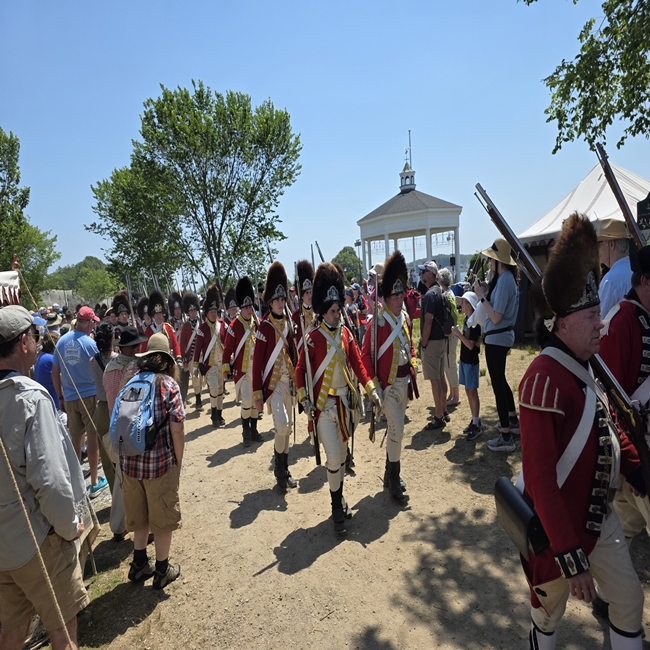
One of the bright lights of New England is learning about history through live re-enactments, and with the 250th anniversay of our 1776 declaration of independence coming, we’ve entered a boom time for interactive events! Last weekend, hundreds of hobbyists re-enacted the Battle of Bunker Hill, with thousands of visitors coming to watch the battles, and walk through the camps to speak with old-time American militiamen, and British soldiers too.
After the Battle of Lexington in 1775, which has its own series of live re-enactments, came the Battle of Bunker Hill. American rebels were dug in on Bunker Hill, which overlooked the city of Boston, where many British loyalists were based, and the British just couldn’t permit the rebels to have the high ground. Thus, the British stormed up the hill, failing twice, and finally pushing the Americans out in a Pyrrhic victory that cost more than double the British casualties (226 dead and 828 wounded) as American casualties (140 killed and 271 wounded) and proved that the Americans, seen as a rabble of amateurs, were a fighting force to be taken seriously. It was the first major battle of the American Revolutionary War.
The re-enactment took place over two days, far north in Gloucester, Massachusetts because they had the space and a good hill for the battle at Stage Fort Park. It’s a strikingly beautiful location, and the site of Gloucester’s first settlers in 1623, building on the success of the settlement in Plimoth.
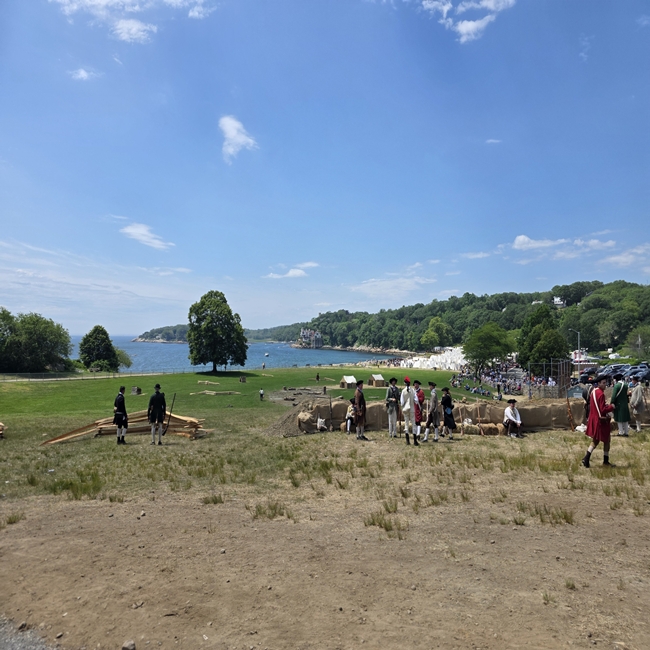
The battle itself was spectacular, with actors firing replica muskets and lining up old-time style out in the open instead of sneaking around guerrilla style as we might do in the modern day. But to me the real magic of live historical re-enactments is speaking with the participants. They have such happy, creative energy and are so passionate about history and wanting to share it with visitors!
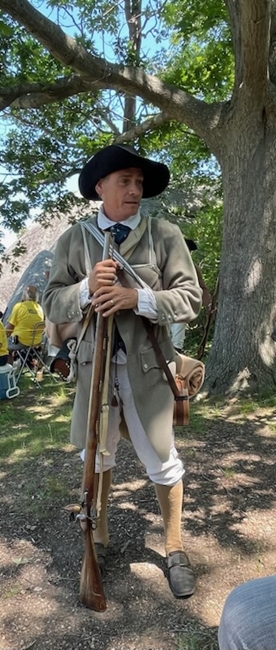 Before the battle recreation, I got to interview re-enactor Jeff Durell, who played one of the American militiamen. He’s an 8th grade social studies teacher in Barrington, New Hampshire, and a participant in living history events for 40 years.
Before the battle recreation, I got to interview re-enactor Jeff Durell, who played one of the American militiamen. He’s an 8th grade social studies teacher in Barrington, New Hampshire, and a participant in living history events for 40 years.
Events INSIDER: Tell me about your troop! These are all volunteers, of course.
Jeff Durell: Yep. We’re all volunteers, and reenacting is our chosen hobby. It’s a passion for many of us. We want to get out there, and we want to live the history. We want to pursue the history. We want to share the history.
Something like this, it only really does come around every 25 years. This is a big one, the 250. You’re bound to get people from all over the country, and literally, people from all over the country are here. We all share the same goal. We want to relive history as accurately and as honestly as we can. And we’re very lucky that we’ve been given a venue to do that today.
Events INSIDER: It’s been 250 years, but that was only three or four lifetimes ago. It wasn’t really that long ago.
Jeff Durell: If you look at European history, American history is in our infancy even still. Americans don’t have a real good perception of history.
Events INSIDER: Does it make you feel connected to your own history?
Jeff Durell: Yes, actually I had a direct ancestor that actually fought in the 2nd New Hampshire. He wound up as a lieutenant in the 2nd New Hampshire, which is the regiment I reenact. His name was Zebulon Durell, and he joined very early on. Old Testament names were big in my family.
Jeff Durell: My ancestor, he joined early on and went from command to command until he finally wound up as a lieutenant in the 2nd New Hampshire. He fought through the entire war and wound up living in Vermont.
Events INSIDER: So Bunker Hill was important beacuse it overlooked the harbor, so it kind of gave you the high ground?
Jeff Durell: They held the high ground. The British really did hold down Boston, but they didn’t hold down anything really outside of Boston. They’d already learned a lesson in Lexington and Concord that they dare not venture too far from Boston.
Events INSIDER: And the Battle of Bunker Hill was really at Breed’s Hill in Charleston, right?
Jeff Durell: It was in Charlestown. Yeah. And the cool thing is the night before, there was no readout. There was no earthen fort. These men dug that entire thing overnight.
Events INSIDER: Wow.
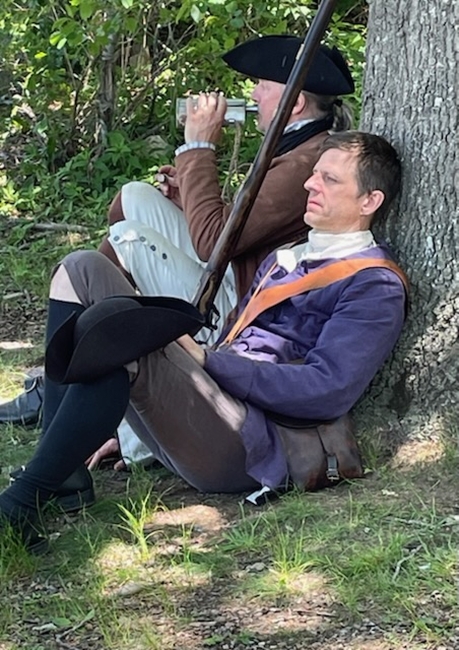
Jeff Durell: The amazing thing is the HMS Lively was evidently the first British ship to spot something that they hadn’t seen the night before. So, the lookout watch brought the officers on deck and said, “Look what they’ve managed to do overnight.” They were absolutely flabbergasted that the Americans militia could build this thing in one night.
Jeff Durell: I think it underscores the determination that the patriots were showing, that they were duty bound to try to bottle up the British in Boston. And they knew full well that the British were going to have to respond. They couldn’t allow this fortification to be built under their nose.
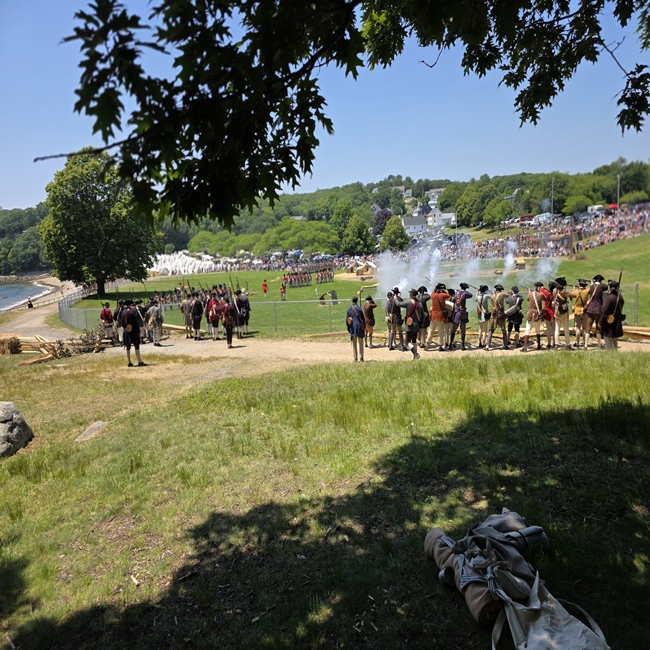
Events INSIDER: This battle was on a peninsula, so could the British have come around from behind and just cut them off? Instead of charging in a frontal assault.
Jeff Durell: The British were the military experts of the day. They were the most professional army. You had a lot of British commanders that really discounted the abilities and the desires of most of the colonials.
Events INSIDER: They thought you would flee.
Jeff Durell: Right. And we did. We had a habit of running away.
Events INSIDER: I’ve seen the Battle of Lexington. Basically, the Americans flee.
Jeff Durell: Yeah. But I’ll tell you what, it didn’t take long after that for 3,000 new colonials to gather up and harass the British for the next 20 miles back to Boston.
Events INSIDER: Oh, okay. Okay.
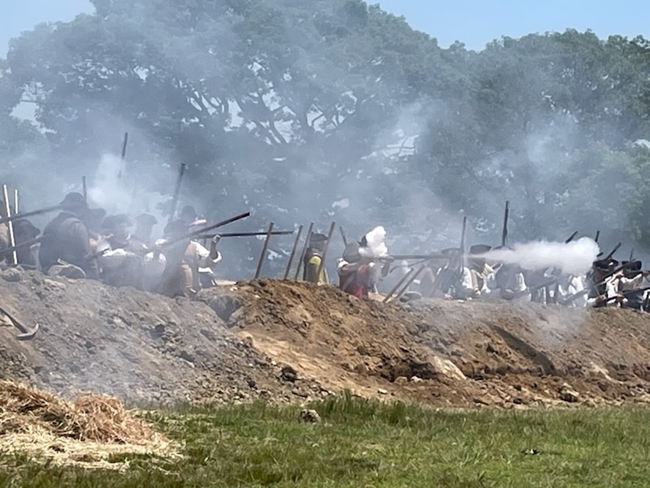
Jeff Durell: So, the British learned a couple lessons. One, that under the right circumstances, the colonials will fight. They didn’t understand that the colonials’ determination, if it’s connected and if it’s concentrated, can be extremely detrimental to the British Army. This is a lesson they had to learn here. The British, they couldn’t imagine that the colonials would withstand a full-frontal assault.
Events INSIDER: Am I correct, though, that they could have gone just behind you on the peninsula?
Jeff Durell: Well, they tried. That’s where my regiment comes into play. During the initial stages of the Battle of New Hampshire, men arrive on scene. We literally drop our packs, just like we just did now, because we are going to be deployed almost immediately, and we’re going to be defending that flank.
Events INSIDER: Great segue. So what are we about to see?
Jeff Durell: We’re about to see this very thing. We’re about to see the British with a full-frontal assault. You’re going to see the Light Infantry and the Grenadier Company and the British Army try to take our flank and turn our flank. We’re going to defend them, and if we do our jobs, then we’re going to send them right back down the hill.
Events INSIDER: I have to describe what we’re seeing for readers. We’re on top of a very short hill overlooking a field that runs down to a beautiful harbor, which today for this event we’re pretending is Boston Harbor.
Jeff Durell: Yeah, that’s Boston Harbor.
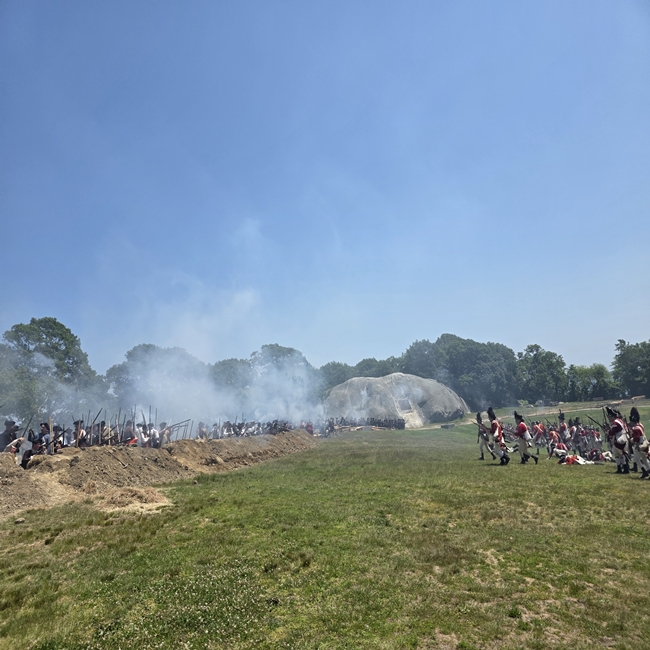
Events INSIDER: And then the British are going to come up the hill as a full-frontal assault. But you guys are not going to flee. You will hold your ground.
Jeff Durell: We’re going to send them back down the hill the first time. They’re going to redouble their attack. This time they’re going to try a frontal assault, but they’re going to do a two-pronged attack, and they’re going to try to come up the right flank this time. They’re going to be repulsed the second time. In real time, 250 years ago, this is when a lot of the Massachusetts and Connecticut troops on top of the hill ran out of ammunition.
Jeff Durell: The third charge is going to be the decisive one for the British, which of course is a Pyrrhic victory because they lose so many people in the process. They chase us [the colonials] off the hill in that third charge, but they pay for it, really.
Events INSIDER: So they fail to surround you and kind of destroy you?
Jeff Durell: Correct.
Jeff Durell: Most of the American army escapes. They lose some key leaders, but it’s a British victory in name only. It’s an eye-opening moment for the British, who realize that if the colonials have this much persistence and stubbornness here, what it could look like for the next few months.
Events INSIDER: So this battle establishes the Americans as a force to be dealt with seriously?
Jeff Durell: Yeah. Back in Philadelphia, the Second Continental Congress has authorized the raising of a Continental Army. They’re going to name George Washington as the head of that army. And Washington is going to get up to Cambridge as fast as he can to take control of us before we all go home. That’s the origination of the army.
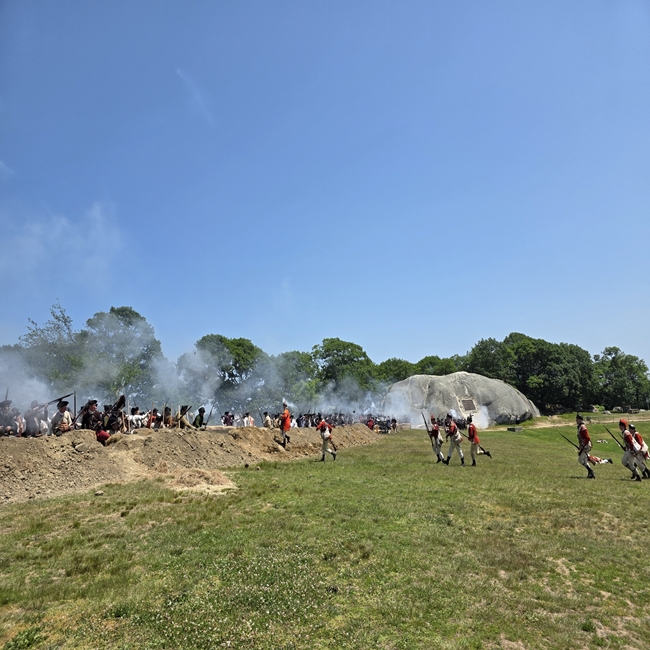
Events INSIDER: One final question. It’s amazing that you hobbyists come out to entertain and educate us all. Thank you so much. And you have to buy your own uniforms, correct, costing perhaps $1,000?
Jeff Durell: I would say that’s pretty accurate. Some of us spend a lot more than that. A typical British uniform is about $2,500 to $3,500, and they all do it independently. Nobody pays us to do this. This is literally a labor of love. We do this only because this is the closest way we can get to something we truly are close to. We’re willing to make that sacrifice in the way that other people that pursue hobbies passionately will also.
Events INSIDER: Thank you so much for sharing this enthusiasm with us.
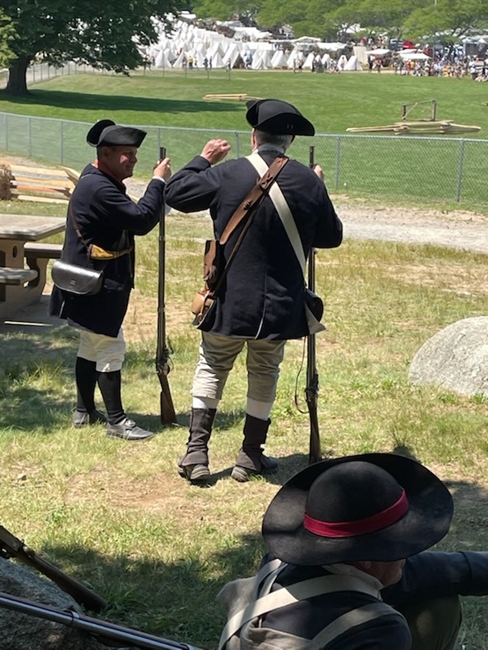
Jeff Durell: Just one more correction.
Events INSIDER: Please.
Jeff Durell: So, there are some real period pieces here, and that’s going to be the brass cannons. The brass cannons typically are 240 to 260 years old. They’re originals. Most of these brass cannons are originals. So the reason you can use an original brass piece is it takes the stress of the cannon firing a lot easier than, say, cast iron does. That’s why you’d never use a cast iron Rev War era cannon, because it’s too unpredictable. It could have been miscast.
Jeff Durell: But a brass or a bronze tube, they can withstand this much, much easier. [So it’s safe to use real, historic cannon made of brass.]
Events INSIDER: Wow! Thank you so much for speaking with us.
The 250th Battle of Bunker Hill re-enactment is now over https://battleofbunkerhill250.com/, but you can see upcoming American Revolutionary War events at:
- Col. Bailey’s 2nd Mass Regiment (reenactment group)
- Revolution 250
- Concord 250
- Massachusetts 250
- The Boston Garrison (reenactment group)
- Redcoats and Rebels (event at Old Sturbridge Village near Worcester)
- List of re-enactment groups by state